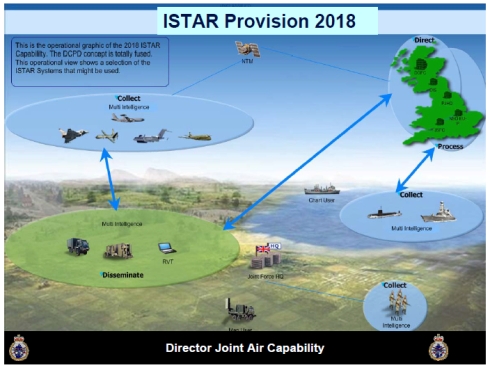UK MoD releases two presentations on British drones to Drone Wars UKBy Chris Coleuruknet.info We have received today two presentations, delivered by senior military officers at the Unmanned Aerial Systems UK Conference in June 2012, released in response to our Freedom of Information request. Regular readers may remember that this conference, due to be held in the centre of Bath, was moved within secure military premises due to planned protests.  The first presentation, 'Information Dominance and UK Approach to Unmanned Systems’, was given by Air Vice-Marshal Mark Green, Director Joint Air Capability. See here for the full text which can be read in conjunction with the slides – click image right. In the first part of his presentation, AVM Green summarises current UK UAV capacity, examines the reasons given for developing unmanned capacity in the last Strategic Defence and Security Review (SDSR) and reflects on the cost/benefit ratio of unmanned vs. manned systems. The second part of the presentation focuses on the future development of British drones. AVM Green stated that he could "envision a time when technically air power could be completely delivered by unmanned aircraft… [ but this] will be reliant on advances in technology, cost effectiveness and in public acceptance." He goes on to outline how the UK is developing armed drone capability through the Scavenger programme and Future Combat Air System (FCAS) and Unmanned Combat Air Systems (UCAS) programmes. Importantly, AVM Green states with regard to autonomy of future drones: "Today we see a great deal of automation with many UASs. Any or none of the functions involved in the operation of an unmanned aircraft may be automated: take-off and landing; navigation/route following; pre-programmed response to events such as loss of a command and communication link; even automated target detection and recognition. On the other hand Autonomous systems will need to be self-aware and their response to inputs indistinguishable from, or even superior to, that of a manned aircraft. As such, they must be capable of achieving the same level of situational understanding as a human. From this understanding and its perception of its environment, such a system will be able to decide on an appropriate action to bring about a desired state without depending on human oversight and control, although the overall activity of an autonomous unmanned aircraft will be predictable, individual actions may not be.  The second presentation released is 'UK Reaper: Update and Influences on UAS Strategy’, by Wing Commander Paul Mounsey, Air Staff Strategy, UAS. While no written text has been released to accompany the slide presentation, it is clear that the presentation addressed current and near future use (apparently the RAF is aiming to achieve 72 hour per day of UK Reaper UAV flights in Afghanistan), training needs – including the need to be able to train within the UK and how UAV crew could be organised. While these two presentation contain no startling revelations about UK drone use or development plans, they do help us have a better understanding of UK drone developments as do presentations released to us previously by the MoD. Source |
Sunday, 1 September 2013
UK MoD releases two presentations on British drones to Drone Wars UK
Subscribe to:
Post Comments (Atom)
No comments:
Post a Comment